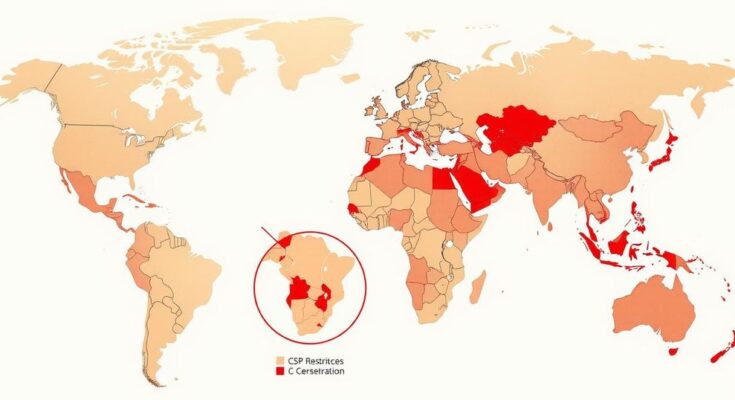The Trump administration plans to impose new US entry restrictions on countries including Afghanistan, Pakistan, Iran, Libya, Somalia, Sudan, Syria, Yemen, Chad, North Korea, and Venezuela. This decision follows an Executive Order aimed at reviewing security measures, with concerns raised by advocacy groups regarding its impact on vulnerable refugees. A final list of affected countries is expected soon, as civil rights organizations oppose these potential restrictions.
The Trump administration is reportedly set to introduce new US entry restrictions for individuals from Afghanistan, Pakistan, Iran, Libya, Somalia, Sudan, Syria, Yemen, Chad, North Korea, and Venezuela. This initiative is a response to an Executive Order issued on January 20, which instructs federal agencies to evaluate countries lacking sufficient security screening and vetting processes. The intended policy seeks to enhance entry requirements, possibly leading to full or partial suspensions of admissions from the identified nations.
During his first term, President Trump instituted several travel bans beginning in 2017, with the initial iteration primarily targeting Muslim-majority countries. This policy faced significant backlash, with many critics labeling it a “Muslim Ban.” Despite legal opposition, the U.S. Supreme Court upheld the third iteration of the ban in 2018, affirming the President’s authority to implement such national security measures.
Although the definitive list of restricted countries remains unverified, Afghanistan and Pakistan may be considered for restriction due to possible security concerns. Advocacy groups, notably the International Refugee Admissions Project (IRAP), caution that these limitations could adversely affect Afghan refugees, particularly Special Immigrant Visa (SIV) holders escaping Taliban-related dangers.
Pakistan’s security protocols and vetting processes are undergoing review, which could result in travel restrictions affecting many Pakistani nationals wishing to enter the United States. As such, thousands may face challenges in acquiring necessary visas if additional restrictions are enforced.
Opposition to these potential restrictions has emerged rapidly, with civil rights organizations such as the American Civil Liberties Union (ACLU) voicing their disapproval, claiming the measures are unjustified. Moreover, critics point out that the State Department and the Department of Homeland Security already implement some of the most rigorous vetting standards worldwide.
As mandated by the Executive Order, the State Department and DHS have a 60-day period to finalize their list of countries that could face these travel limitations. With the deadline nearing, an official announcement is anticipated shortly. For further information, individuals are encouraged to consult the official websites of the U.S. Department of State and the Department of Homeland Security.
The Trump administration is considering new entry restrictions for several countries, focusing on enhancing national security through stricter vetting processes. Initial bans implemented during Trump’s first term faced significant backlash and legal scrutiny. Advocacy groups have raised concerns about the implications for vulnerable populations, particularly Afghan refugees. With a deadline approaching, the final list of restricted nations will soon be announced, signaling significant implications for U.S. immigration policy.
Original Source: www.travelandtourworld.com




